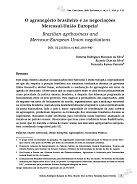O agronegócio brasileiro e as negociações Mercosul-União Europeia
DOI:
https://doi.org/10.21530/ci.v14n3.2019.940Abstract
The paper aims to analyze the negotiations between Mercosur and the European Union, emphasizing the Brazilian position during Dilma Rousseff and Michel Temer administrations. We highlight the coordination of agribusiness regarding trade policy. We observe that the negotiations between the two blocs remained a priority of Brazilian foreign policy, despite the fundamental programmatic differences between Rousseff and Temer. To explain the continuity of the negotiations and the impasse surrounding the closure of the agreement, we argue that the structural change in the Brazilian economy, marked by progressive deindustrialization and reprimarization of exports, along with the greater coordination capacity of agribusiness collective action, produced impacts on the formation of Brazilian interests during the negotiations. We bring evidence to corroborate our hypothesis, analyzing the negotiations in the recent period. We note that items dear to the industry sector were relaxed, while the defense of greater access to European agricultural markets was kept, an item considered non-negotiable by the EU.
Downloads

Published
How to Cite
Issue
Section
License
Authors who publish with this journal agree to the following terms:
- Authors retain copyright and grant the journal right of first publication with the work simultaneously licensed under a Creative Commons Atribuição 4.0 Internacional that allows others to share the work with an acknowledgement of the work's authorship and initial publication in this journal.
- Authors are able to enter into separate, additional contractual arrangements for the non-exclusive distribution of the journal's published version of the work (post it to an institutional repository or publish it in a book, for example), with an acknowledgement of its initial publication in this journal.


